Many are unaware that poop-eating is a sign of nutritional deficiencies, in particular, B12 deficiency! Feces-eating apes are often seen as disgusting, funny, or just stupid! But primates are none of that! Eating poop (coprophagy) is a form of supplementing nutrition and thus happens more in unnatural settings – in zoos – and is a serious indication of a needed dietary adjustment of apes in zoos towards a more natural, tropical, fruit-rich diet (read our article on the misunderstood frugivorous diet in captive apes here).
Coprophagy in apes – why do the animals eat their excrements?
Coprophagy has several benefits, like taking in nutrients, undigested foods, and adding to a healthy microbiome under circumstances where the animals are in need of those benefits.
Coprophagy in animals is known to be a form of “naturally supplementing” nutrients. Animals sometimes consume the feces of other species (often from herbivores that have an “especially nutritive” microbiome) and sometimes their own feces. This is not surprising, as many animals, including chimpanzees, are known to be able to self-medicate in the wild!
One critical vitamin obtained from feces is vitamin B12. Because the vitamin is either obtained from animal-based foods or from the microbiome. However, if the microbiome is compromised, poop as a B12 source comes into play. Here’s why:
Regarding the microbiome as a source of vitamin B12, there seems to be an “anatomical quirk” in non-ruminant mammals, like apes and humans: Vitamin B12 is synthesized by the microbiome, but it is excreted without being absorbed. However, there is some evidence that this only happens because of compromised gut health (i.e., due to suboptimal diet or environmental toxins), and if the microbiome is not optimally distributed up to the ileum where B12 is absorbed. As a response animals can eat B12-containing feces or forage for dietary sources. Thus excrement can be a natural B12-“supplement” for many animals, including apes.
Is coprophagy really a natural behavior?
Apes are known to be coprophagous in captivity, but this type of behavior is very rare in the wild. Why does it happen more often in captivity?
One question here is: How do the largely plant-based, non-ruminant animals get B12 in captivity? In the wild, they eat B12-rich insects. Additionally, their microbiome is likely healthier in a natural setting than when being kept in colder climates and suboptimal feeding:
When looking at vitamin B12 in humans, we learn that the intestinal absorption of B12 is possible under natural conditions and an optimal diet. The same seems to be true for other apes, where vitamin B12 deficiency is a bigger issue in captivity, than under natural conditions! In the wild, apes eat their species-specific diet and thus have a healthier microbiome, which is able to provide the host with B12!
However, coprophagy serves additional health purposes like increasing beneficial intestinal bacteria in gorillas:
Gorillas have been shown to strengthen the microbiome of infants, besides obtaining B12 by eating their feces:
“Coprophagy may also provide gorillas with vitamin B12, produced by bacteria in the hindgut, but only able to be absorbed in the foregut.”
Cooper & Redmond, 2017
It’s important to note that the diet of gorillas is herbivorous (frugivore-folivores), which makes their feces to be of a different consistency than that of omnivores or carnivores. Coprophagy is generally observed with the feces of plant-eaters. For example, dogs tend to eat horse or goose excrement.
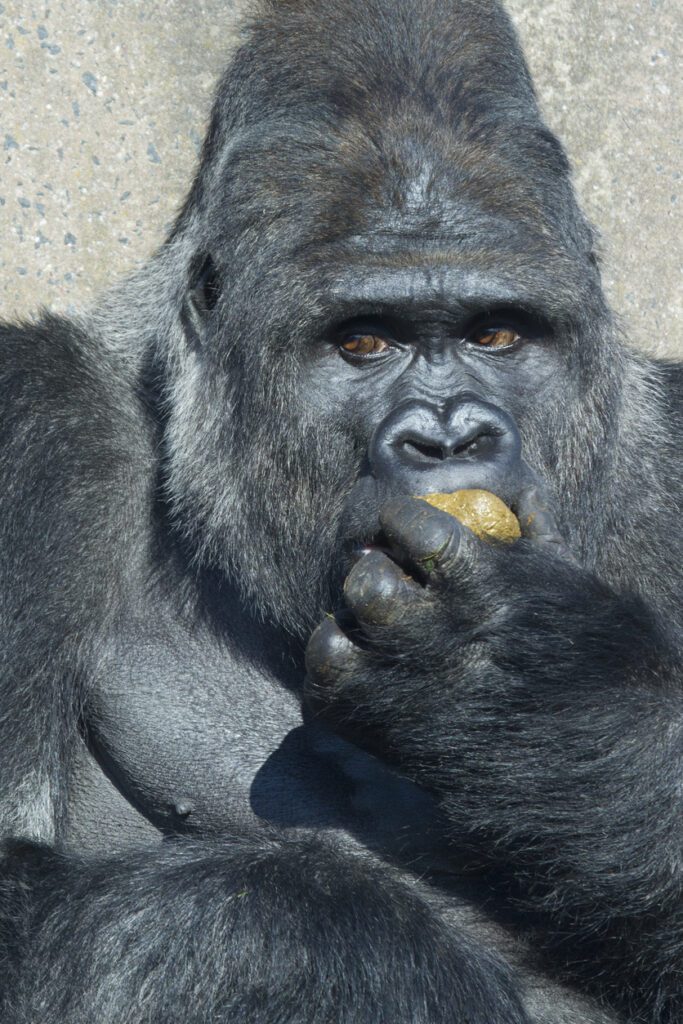
Chimpanzees – which are omnivorous frugivores – eat their poop from time to time in the wild, but not regularly. Despite the fact that the frugivores are easily repulsed by touching weird, unknown things (like in humans, disgust serves as a protective instinct), they do not seem to be disgusted by their excrements. This illustrates that coprophagy is a vital, nutritionally-driven behavior when necessary.
Conclusion: Coprophagy is an indication of B12 deficiency and a suboptimal diet in captivity
We need to be aware that we mostly observe animals eating feces to obtain vitamin B12 in unnatural habitats, like zoos and domestic animals! In the wild, most apes are highly herbivorous but get B12 from insects or other small amounts of animal foods. They “supplement” less B12 through feces.
Therefore, extensive coprophagy of apes in captivity is not a good sign but rather an indication of nutritional deficiency – which is not surprising considering the current dietary guidelines for primates in zoos.
Eating feces seems to be a last-resort solution to combat B12 deficiency in animals, including frugivorous apes: they usually eat B12-rich insects in the wild and have a natural microbiome that may contribute to providing vitamin B12 to the host.
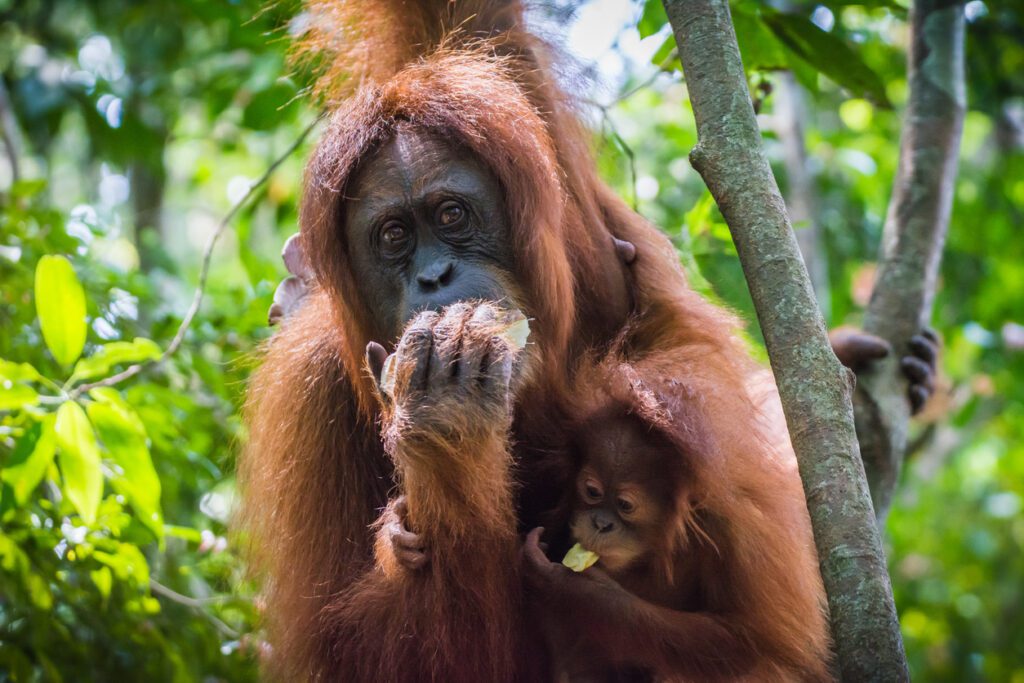
Eating poop is not funny or stupid, but an indication that the diets of apes in captivity are often not natural and could contribute to a shortcoming in vitamin B12. Read more about the diet of apes in captivity here:
References
- J. Shurkin, Animals that self-medicate, PNAS (2014). Available at: https://www.pnas.org/doi/10.1073/pnas.1419966111 (Accessed: April 4, 2023).
- Intestinal bacteria as a vitamin B12 source (no date) VeganHealth.org. Available at: https://veganhealth.org/vitamin-b12/intestinal-bacteria-as-b12-source/ (Accessed: April 5, 2023).
- Prates, H.M. and Bicca-Marques, J.C. (2005) ‘Coprophagy in captive Brown Capuchin Monkeys (Cebus apella)’, Neotropical Primates, 13(3), pp. 18–21. doi:10.1896/1413-4705.13.3.18.
- Sakamaki, T. (2009) ‘Coprophagy in wild bonobos (Pan Paniscus) at Wamba in the Democratic Republic of the Congo: A possibly adaptive strategy?’, Primates, 51(1), pp. 87–90. doi:10.1007/s10329-009-0167-9.
- Coprophagy (no date) Coprophagy – an overview | ScienceDirect Topics. Available at: https://www.sciencedirect.com/topics/agricultural-and-biological-sciences/coprophagy (Accessed: 28 May 2023).
- Kyoto University. “What grosses out a chimpanzee? The origins of disgust: Origins of disgust.” ScienceDaily. ScienceDaily, 17 November 2017. <www.sciencedaily.com/releases/2017/11/171117103820.htm>.

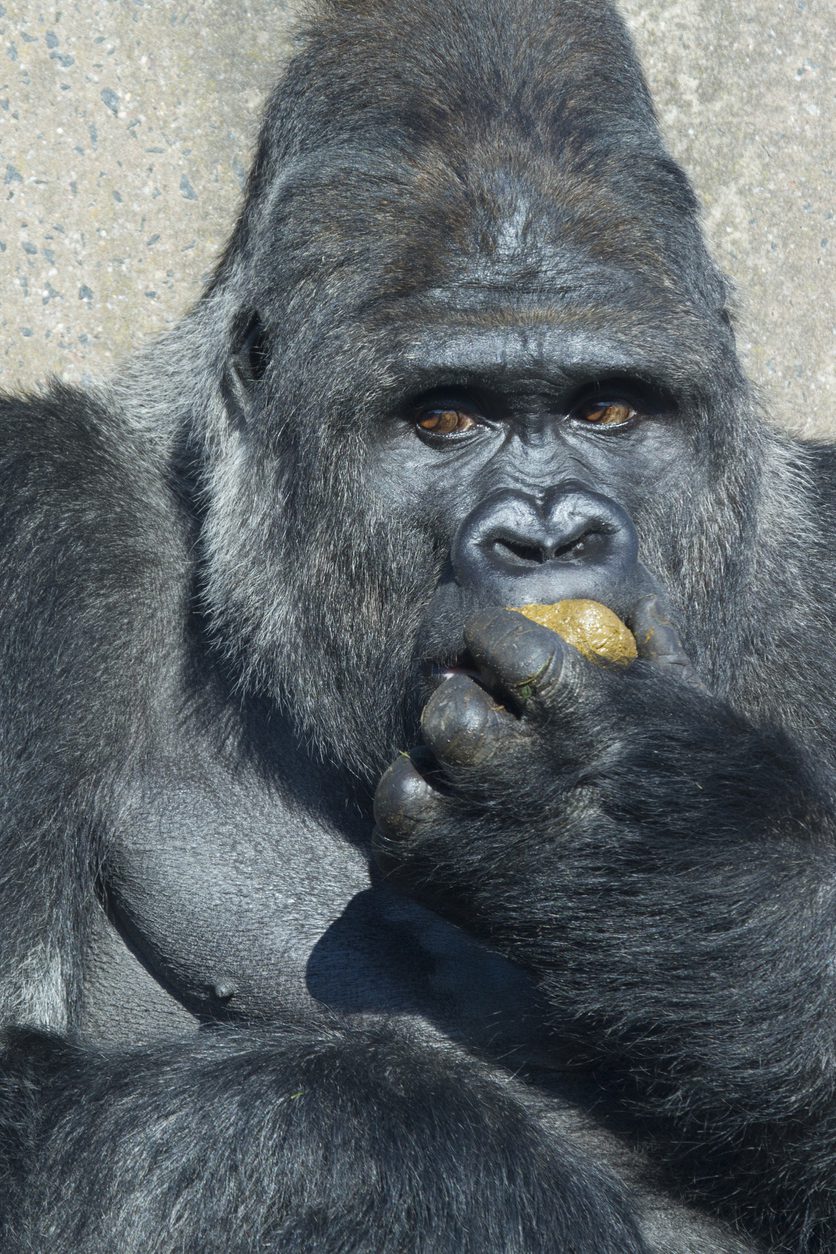
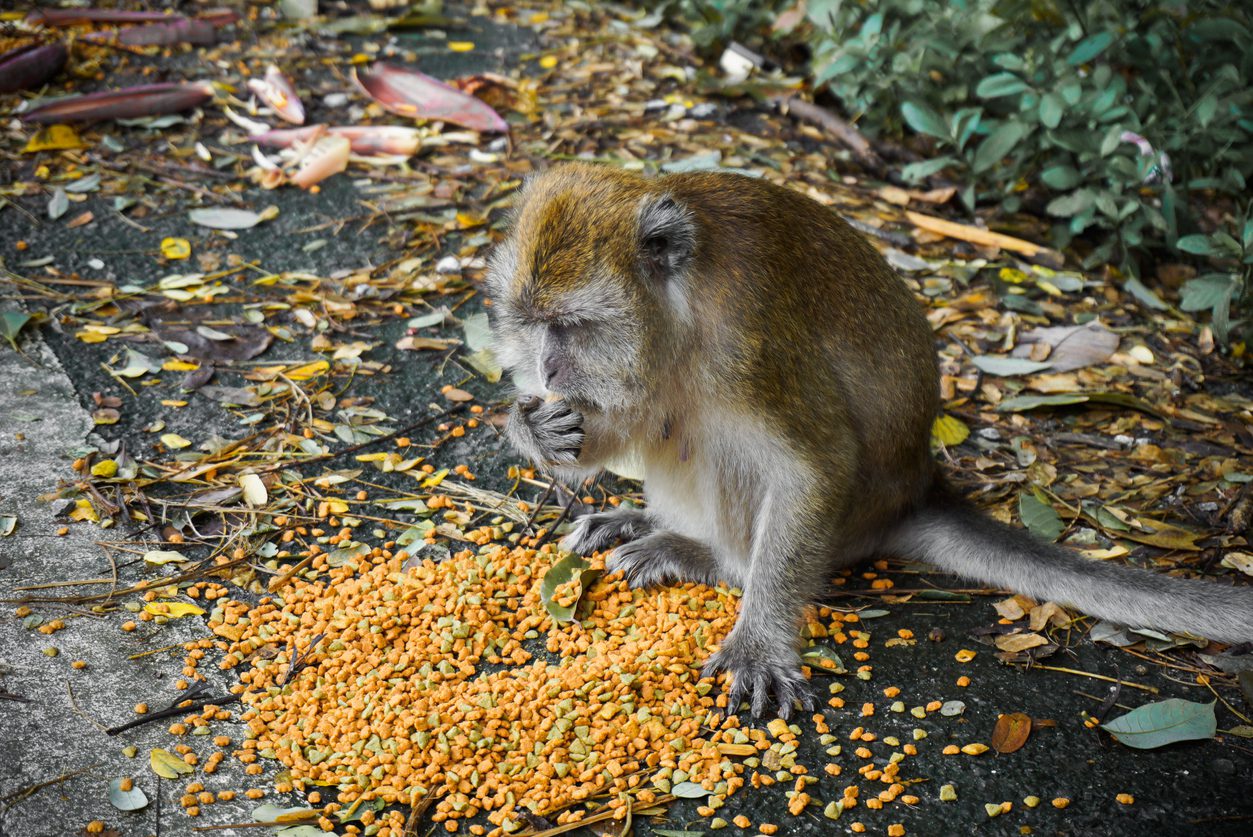
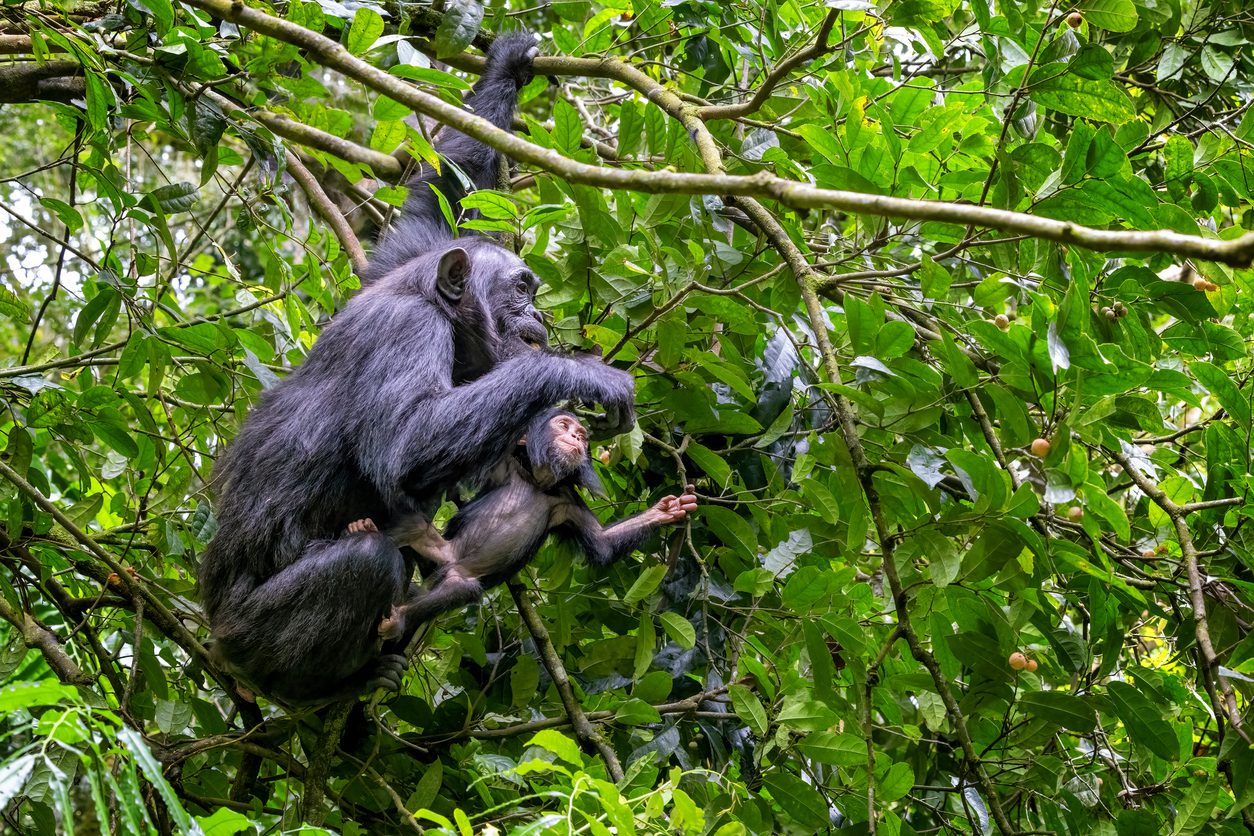
Add Comment